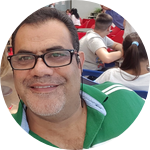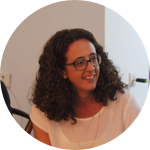About This Project
Separations between parents and adolescents challenge adolescents' optimal functioning. Using survey methodology and quantitative analyses, we will describe the quantity and quality of communication between Israeli military parents and their adolescents when the parents are routinely away from home. We will also describe the benefits of long distance communication for the adolescents' functioning. Findings will inform programs promoting family communication.
Ask the Scientists
Join The DiscussionWhat is the context of this research?
Several lines of scientific inquiry motivated our research. The first pertains to the links between the long family separations due to US military deployments and the functioning of military-connected children of different ages, including adolescents (Ref. 6 & 7). Another line of inquiry pertains to the increasing role of technology-assisted communication as a means of building and maintaining relationships between members of the family (Ref. 8). Our research is also grounded in conceptualizations of interpersonal communication (Ref. 2 & 5), parent-child interaction (Ref. 1), and our empirical findings (Ref. 3). There is no information about communication from afar in Israeli military families where parents routinely don't see their children for two weeks at a time.
What is the significance of this project?
Variations in the quantity and quality of distance communication and the links between such variations and the adjustment of adolescents who cannot interact face to face with one of their parents due to their parents' long-term deployments (e.g., six months at a time) have only begun to be investigated in the US military context (Ref. 3). The evidence suggests wide variations in communication and that supportive distance communication is linked to better adolescent adjustment. The proposed study will provide information about distance communication when military parents are routinely unavailable for face-to-face communication for short periods of time (e.g., two weeks at a time), thereby extending our understanding of the conditions under which distance communication is useful.
What are the goals of the project?
We will first translate three surveys (adolescent; mother; father) from English to Hebrew. The translation will be done by a professional survey company TNS teleseker. This is important because we need to make sure that the translation is scientifically and culturally accurate and valid. We are crowdfunding for this step of our research. Following some pilot work with about 15 military families, we will contact by email and phone about 800 married professional members of the Israeli Defense Force. Our goal is to recruit 200 families in which the father, mother and adolescent (age 11 to 18) agreed to participate in our study. Once we have recruited and consented/ assented our sample, the fathers, mothers and adolescents will fill in our online questionnaires.
Budget
We are asking for $ 4,177 for translating three surveys from English to Hebrew. We have three overlapping surveys: one for the mothers (the longest), the second for the fathers and the third for adolescents (the shortest). The surveys include questions about demographics, relationships between members of the family, distance communications between the adolescents and the parents who are away and the functioning of the adolescents. One of us with her US colleagues developed the survey questions about distance communication and borrowed from existing measures of family demographics, family relationships and child functioning. We used the surveys in our research with English-speaking research participants (Ref. 3 & 4). The budget figures for translation (inclusive of 17% value added tax) were obtained from tns-teleseker.com, a leading market research organization in Israel. With the translated surveys in hand we will launch our planned research.
Endorsed by
Meet the Team
Affiliates
Affiliates
Team Bio
The team consists of Drs. Sarah Friedman, Avi Sagi Schwartz and Meytal Eran Jona. The first two are experts in developmental psychology and have known each other for many years. After Dr. Friedman read the inspiring publications of Dr. Eran Jona on the topic of Israeli military families, she first wrote to and later met with Dr. Eran Jona. The three investigators who collaborate at a distance were born in Israel and wish to improve conditions for Israeli youth through scientific evidence.
Sarah L. Friedman
I have always been interested in people and the conditions that shape them. This led me to study literature for my BA, educational psychology for my MA and child development for my Ph.D. My core interest was also expressed in my work in the area of child development and education.
My scientific papers and edited books address a wide range of topics. Most recently, my research has focused on child care and children’s psychological and health development, on the development of children's planning skills and on military connected children whose life conditions present unique stresses and opportunities which were unexplored until very recently.
I find the study of distance communication fascinating. It is part of the life of everybody I know. It is an important tool that can be used to bring people closer or to offend them. And yet, we know very little about the conditions that shape the frequency of its use, the way it is used or the consequences of its use for relationships and for psychological adjustment. I believe that the results of the proposed study will contribute to such understanding and to a public education campaign.
Meytal Eran Jona
I am a senior sociologist and head a research center at the IDF (Israeli Defence Forces) BSC- Behavioral Sciencesc Center.
My area of expertise are:
Organizational Sociology
Military families
Gender issues in the military
Civil Military Relations in Israel
Public opinion
Abraham Sagi-Schwartz
My main research interests are in the area of attachment and socioemotional development across the life span and across cultures. In recent years, I have studied socioemotional development and adaptation under extreme life circumstances and experiences, especially the effects of the Holocaust as well as other violent political conflicts. I have a special interest in transforming basic knowledge generated by child development research to various policies and interventions that may advance the well-being of children across the world. Within this context, I am currently the academic head of the newly launched International MA Program in Child Development for Developing Countries at the University if Haifa.
Additional Information
References:
1. Borkowski, J. G., Ramey, S. L., & Bristol-Power, M. (Eds.). (2002). Parenting and the child's world: Influences on academic, intellectual, and social-emotional development. New York: Psychology Press.
2. Dillard, J. P., Solomon, D. H., & Palmer, M. T., (1999). Structuring the concept of relational communication. Communication Monographs, 66, 49-65. doi:10.1080/03637759909376462
3. Friedman, S.L., Sigelman, C.K., Rohrbeck, C.A., and del Rio-Gonzalez, A.M. (2016). Quantity and Quality of Communication during Parental Deployment: Links to Adolescents’ Functioning. Applied Developmental Science. http://dx.doi.org/10.1080/1088.
4. Jazi, E.S., Leival, E.K., Friedman, S.L., Sigelman, C.K., and Rohrbeck, C.A. (June 27, 2016). Factors Associated with Communication between deployed parents and their children. Poster presented at the National Training Seminar of Military Child Education Coalition. Washington DC.
5. Koerner, A. F., & Fitzpatrick, M. A. (2002). Toward a theory of family communication. Communication Theory, 12, 70–91.
6. Maholmes, V. (2012). Adjustment of children and youth in military families: Toward developmental understanding. Child Development Perspectives. 6, 430-435.
7. Park, N. (2011). Military children and families: Strengths and challenges during peace and war. American Psychologist, 66, 65-72. doi:10.1037/a0021249
8. Webb, L. M., Ledbetter, A. M., & Norwood, K. M. (2015). Families and technologically assisted communication. In L. H. Turner & R. West (Eds.), The SAGE handbook of family communication (pp. 354-369). Thousand Oaks, CA: Sage.
Project Backers
- 35Backers
- 100%Funded
- $4,177Total Donations
- $115.33Average Donation










